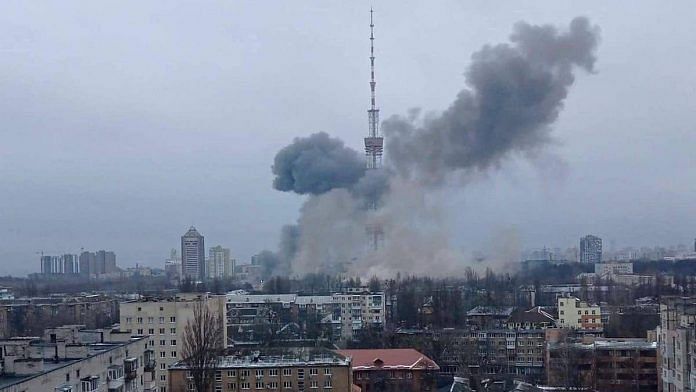
Thank you dear subscribers, we are overwhelmed with your response.
Your Turn is a unique section from ThePrint featuring points of view from its subscribers. If you are a subscriber, have a point of view, please send it to us. If not, do subscribe here: https://theprint.in/subscribe/
The other day a friend of mine said to me that the war in Ukraine is economically benefitting Russia, while every other country is losing. Extension of that statement being, hidden economic benefits to Russia are the ‘real’ drivers of the war. He egged me on– it can be a real thriller; why don’t you write about it?
I was initially dismissive but once the arguments soaked in, I said to myself – why not draw up a fund flow statement with the key incremental impactors. Being a finance person, it was not difficult for me to visualize the key data points to get me there. As it turns out, it is nowhere near any international conspiracy-laden thriller. Sadly, I must disappoint my friend for now.
Russia’s GDP is approx. $ 1.8 Trillion or $1,800 Bn with a population of 145m (UK $3.3 Trillion GDP with population of 68m, India at $3.2 Trillion with population of 1,470m & Australia at $ 1.6 Trillion with population of 26m as reference).
Annual Exports (normalized at steady state) are about $400 Bn: Petroleum $130 Bn, Metals and Minerals $70 Bn, Gas $30 Bn being the main contributors. It is obvious that the Russian economy is heavily dependent on extractive industries.
International trade blockade has restricted its main export driver ie Oil, which is now mainly being bought by Asian countries including India, at negotiated price points. Hence, it is likely that Russia is not benefiting from higher petroleum prices. At best it will manage to maintain the pre-war oil export value.
Talking of Gas, there have been screaming headlines ranging from “Gas blackmail” to “EU prepares for Russia to cut off Gas”. And it’s not winter yet!
Europe and specifically EU countries, are the main importer of Russian Gas. It is reported that Europe has increased import of Liquified Natural Gas ie LNG to lessen dependency on Russian piped Gas. The extent of substitution by LNG is limited by supply chain and logistics for now. The fear of ‘no gas’ will in likelihood speed up the search for stable alternative sustainable energy at scale. Now that the fear is closer to home, could this be the current equivalent of ‘race to the Moon’ ?
Before the war, Russia’s S&P sovereign credit rating was ‘CCC-‘ and in March 2022 was downgraded to CC i.e., ‘currently vulnerable to highly vulnerable’ (AAA being the highest, followed by AA). Compare that with India’s rating of ‘BBB-‘ as a reference.
Developments in Sri Lanka provide a glimpse into the negative intangibles associated with a downgrade. Sri Lanka was downgraded to below CC in April 22.
Further, external debt of Russia is 27% of its GDP vs India’s external debt to GDP of 20%. With lowering of credit rating, the servicing cost or interest of its debt will increase and slow-down incoming capital. Also, it is public news that Russia has already defaulted on its debt obligation in June 2022, its first since 1918.
Of course, then there is re-building after the war. Physical re-building and re-engagement in international commerce will run over a much longer period. I cannot claim to be well informed on the societal impact in Russia. However, just as wars can unify people under a flag, it can also cause disappointment.
One can draw up a simplistic table with key impactors to assess an estimated impact of the war to the Russian economy. That hole is a big one. Sadly, no amount of lateral thinking could help me uncover ‘hidden’ upsides.
| Key Impactors | Estimated annualized ‘incremental impact’ range.
(Red is negative & Black positive |
| Costs $ 900M a day (source: Newsweek).
Other estimates range between $1Bn and $750m a day
Including re-allocation of resources/capital to meet military needs. |
$275 Bn – $350 Bn |
| Sovereign credit rating downgrade to CC grade. | $15 Bn – $20 Bn
(Intangibles are additional) |
| Oil (unlikely benefit) and Gas | $40 Bn – $75 Bn |
| Re-building cost after war | ? |
‘* impacts are estimates
The other 2 aspects that should not be forgotten
- Post Covid, most countries have realized the importance of not putting all the eggs in one basket. This trend of cost increase will not reverse in the mid-term. So, building capacity and even re-building will be costlier for everyone.
- Sustainability and ESG imperatives will facilitate increased co-operation and anyone that chooses to sit-out or is made to sit-out will be at a serious disadvantage
I agree that the war is never meant to be seen only through the prism of an accountant. If indeed this was a clever gambit, then the advantage to Russia is on a timeline that is way too far for me to spot, possibly beyond my lifetime. And I am just sixty-one.
These pieces are being published as they have been received – they have not been edited/fact-checked by ThePrint.


COMMENTS